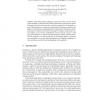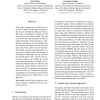1249 search results - page 176 / 250 » Intelligent Agents: The Key Concepts |
ICAS
2009
IEEE
14 years 3 months ago
2009
IEEE
The volumes of data in information systems are growing drastically. The systems become increasingly complex in trying to handle heterogeneity of ubiquitous components, standards, ...
DALT
2009
Springer
14 years 3 months ago
2009
Springer
What distinguishes multiagent systems from other software systems is their emphasis on the interactions among autonomous, heterogeneous agents. This paper motivates and characteriz...
ICCCI
2009
Springer
14 years 3 months ago
2009
Springer
The conceptual world of AI is inhabited by a number of epistemic puzzles whose role is to provide a test harness environment for various methods and algorithms. In our paper we foc...
EUSFLAT
2003
13 years 10 months ago
2003
This paper suggests an evolutionary approach to design coordination strategies, a key issue in distributed intelligent systems. We focus on competitive strategies in the form of f...
APIN
2006
13 years 9 months ago
2006
The Multi-Agent Distributed Goal Satisfaction (MADGS) system facilitates distributed mission planning and execution in complex dynamic environments with a focus on distributed goal...


